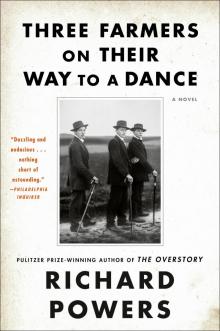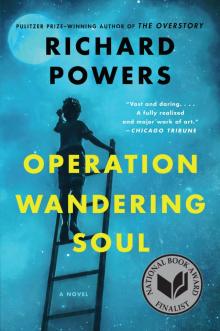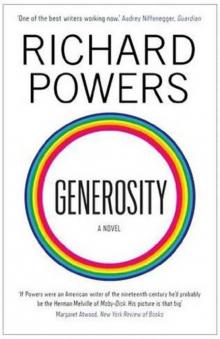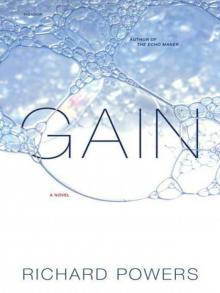- Home
- Richard Powers
Bewilderment Page 8
Bewilderment Read online
Page 8
On Geminus, seasons were places. Walking a few miles toward the boundary belt took me from August to January. He had to be somewhere on the side of constant night. What people would he find there, shaped by lethal cold? Cunning and ingenious, diggers of heat mines and farmers of subterranean fungi. Brutal, barbaric, and depressed killers, competing for every priceless calorie.
He had been looking for me as well. Nearing the temperate boundary belt, I saw him a long way off, rushing from the other side. I broke into a run, but he held up his hands to stop me. I realized, there on the edge of darkness: he had seen the raw night sky. He’d looked at stars as no one on Earth ever would again. He’d seen change and time, cycles and variety. Math and stories, as countless, subtle, and various as the black-backed constellations.
He called to me, from over the standing edge of dark. Dad. Dad! You have no idea. But I was trapped in light and couldn’t cross over.
LOTS OF PEOPLE LOVED MY WIFE. And Aly loved lots of people, as if that were the most natural thing in the world. She’d had partners before me and stayed on good terms with most of them, even with one woman who’d broken her heart. Flirting was a part of her job. I watched her work hallways full of legislators and ballrooms full of donors as if they were all her dear friends.
She was on the road a lot, directing her NGO across ten midwestern states. For the first two years of our marriage, it used to kill me. She’d call me from some budget interstate hotel to say, We went to a great little Italian place downtown, and when I croaked a casual, “We?” she’d say, Oh, didn’t I say? Michael Maxwell’s in town. My ex from grad school? And that would be another eight hours of night thoughts I didn’t need.
Her ten-state area hosted an equal-opportunity harem of devoted women and men. Some of these friendships I knew about; others came as surprises, at her memorial service. The one time I asked whether she was ever tempted to stray, her jaw popped open in astonishment. Oh my God. I am so not built that way! I’d split into little pieces if I ever tried that.
I settled into a manageable mix of jealousy and thrill. Lots of good, kind people wanted my wife. My wife seemed to want me. Nature, as Aly often showed me, was quite ingenious in keeping people just happy enough.
So it didn’t surprise me when she came home late from the farmers’ market one Saturday, bubbly from a round of flattering attention. I ran into Marty Currier at the Apple Lady’s stand. We had a quick coffee. He wants us to be in an experiment!
Martin Currier was one of Wisconsin’s high-profile scientists: senior research professor in neuroscience, National Academy of Sciences fellow, Hughes Investigator—the kinds of recognitions I dreamed of winning once but never will. He was one of the few people in town Aly could bird with and learn something from. They’d go out together in all seasons, and it made me nuts.
“Does he, now? I’m sure he’d like to experiment on you.”
She grinned and tucked into her pugilist stance, circling her fists in front of her face, bobbing and weaving. She always held her small fists way too close together when threatening to rabbit-punch me. I loved that.
Come on, buster. We should try it. He’s doing wild things.
The Currier Lab was exploring something called Decoded Neurofeedback. It resembled old-fashioned biofeedback, but with neural imaging for real-time, AI-mediated feedback. A first group of subjects—the “targets”—entered emotional states in response to external prompts, while researchers scanned relevant regions of their brains using fMRI. The researchers then scanned the same brain regions of a second group of subjects—the “trainees”—in real time. AI monitored the neural activity and sent auditory and visual cues to steer the trainees toward the targets’ prerecorded neural states. In this way, the trainees learned to approximate the patterns of excitation in the targets’ brains, and, remarkably, began to report having similar emotions.
The technique dated back to 2011, and it claimed some impressive early results. Teams in Boston and Japan taught trainees to solve visual puzzles faster, simply by training them on the visual cortex patterns of targets who’d learned the puzzles by trial and error. Other experimenters recorded the visual fields of target subjects exposed to the color red. Trainees who learned, through feedback, to approximate that same neural activity reported seeing red in their mind’s eye.
Since those days, the field had shifted from visual learning to emotional conditioning. The big grant money was going to desensitizing people with PTSD. DecNef and Connectivity Feedback were being touted as treatments to all kinds of psychiatric disorders. Marty Currier worked on clinical applications. But he was also pursuing a more exotic side-hustle.
“Why not?” I told my wife. And so we volunteered in her friend’s experiment.
IN THE RECEPTION AREA OF CURRIER’S LAB, Aly and I chuckled over the entrance questionnaire. We would be among the second wave of target subjects, but first we had to pass the screening. The questions disguised furtive motives. HOW OFTEN DO YOU THINK ABOUT THE PAST? WOULD YOU RATHER BE ON A CROWDED BEACH OR IN AN EMPTY MUSEUM? My wife shook her head at these crude inquiries and touched a hand to her smile. I read the expression as clearly as if we were wired up together: The investigators were welcome to anything they discovered inside her, so long as it didn’t lead to jail time.
I’d given up on understanding my own hidden temperament a long time ago. Lots of monsters inhabited my sunless depths, but most of them were nonlethal. I did badly want to see my wife’s answers, but a lab tech prevented us from comparing questionnaires.
DO YOU USE TOBACCO? Not for years. I didn’t mention that all my pencils were covered with bite marks.
HOW MUCH ALCOHOL DO YOU DRINK A WEEK? Nothing for me, but my wife confessed to her nightly Happy Hour, while plying the dog with poetry.
DO YOU SUFFER FROM ANY ALLERGIES? Not unless you counted cocktail parties.
HAVE YOU EVER EXPERIENCED DEPRESSION? I didn’t know how to answer that one.
DO YOU PLAY A MUSICAL INSTRUMENT? Science. I said I might be able to find middle C on a piano, if they needed it.
Two postdocs took us into the fMRI room. These people had way more cash to throw around than any astrobiology team anywhere. Aly was having the same thoughts about her impoverished NGO. I hoped envy wouldn’t cloud our brain scans.
I braved the scanner first. Aly sat with Martin Currier in the control booth behind a bank of monitors. That seemed suspect to me, but he was the one with all the research awards. The earpiece I wore inside the fMRI tube instructed me to relax, close my eyes, and listen to my breathing. They fed me some stimuli, for calibration. There was a bit of Moonlight Sonata and a snippet from something harsh and modern. They told me to open my eyes. A screen above my face showed, in turn, images of a bluebird on a branch, a happy baby, a magnificent holiday meal, and a close-up of a fractured forearm with bone coming through the skin. After that, I was told to close my eyes for another minute and mind my breathing again.
Then came the real experiment. Aly and I would each be given a random feeling from the eight core emotional states in Plutchik’s typology: Terror, Amazement, Grief, Loathing, Rage, Vigilance, Ecstasy, or Admiration. We’d have four minutes to inhabit our given mental state. Software would make a three-dimensional map of part of our limbic system while we were absorbed in the task.
They gave me Admiration. I closed my eyes and settled into vague thoughts about Einstein, Dr. King, and Sydney Carton. But off in the booth, my wife was watching the ebb and flow of my feeling. The thought of her made me remember an evening we’d lived through together, in the depths of an upper midwestern winter four years before.
Aly had just been appointed midwestern coordinator, and the man replacing her as state supervisor was proving to be inept. In Maryland for the organization’s three-day biannual national meeting, she’d spent hours on the phone nursing her successor through various crises. While there, she caught a nasty cold. Ice storms delayed her return flight by half a day. I picked her up at the airport at nine at
night, little Robbie in tow. In her absence, he’d developed an ear infection. He howled until after midnight, when Aly let her sick and weary head touch the pillow at last.
The phone woke her at one-thirty in the morning: her hapless new state supervisor, calling in a tizzy. The police way upstate in Rhinelander had found a truck with a dozen caged dogs left for hours in subzero temperatures in a Walmart parking lot. They traced the truck to a sprawling puppy mill, which they shut down. Hundreds of dogs flooded into Oneida County’s sole overwhelmed shelter. The locals reached out to Aly’s NGO, although such a problem lay way outside her rights-oriented organization’s bailiwick.
Her successor wanted to know who to dish the crisis off on. Aly told him, What are you talking about? Go up and help them out. The man said that was way below his pay grade. They talked for twenty minutes, with my zombied wife never once sounding anything less than rational. The man still refused. So at sunrise Alyssa packed a backpack and got in the car to drive three and a half hours on icy state roads by herself. I kept asking, “Are you sure?” Not exactly the support she deserved.
She returned forty-eight hours later, after shepherding two hundred dogs to shelters across upper Wisconsin. She got out of the car looking like a Central Casting nineteenth century French peasant dying of consumption. She went straight to wailing Robin and comforted him for an hour. Then she wrote a speech she had to deliver in Des Moines the next day. After midnight once again, she looked at me with comically crossed eyes, proclaimed herself tuckered out, and slept for five hours before getting up to drive to Iowa.
My wife was admirable the way I was tall. But admiration barely touched what I felt. The feeling flowing through me felt like a geometric proof. I revered my wife. She was who she should be in this world, without once worrying about what that meant. I could never hope to emulate her. I just hoped she could see, from the control booth, in front of those monitors, what flooded my brain.
The run ended and my trance broke. The techs recalibrated the software by showing me the earlier images and having me count backward from ten to one. Then they rolled the dice again and gave me a second target: Grief.
As soon as the word sounded in my earbuds, my pulse spiked. Truth is, I’m profoundly superstitious—not in my head, which science has retrained, but in my limbs. I’m good at old feelings, and grief must be older than awareness itself. Way too easily, my body embraces my worst imaginings. The several minutes I’d just spent admiring my wife now turned inside out. I was back in that vivid night, now with disaster everywhere. My son’s ear infection turned septic and fatal. Puppy mill killers captured my wife and tortured her. Sleep-deprived and overworked, she drove off the icy road and lay in a ditch for hours.
What’s grief? The world stripped of something you admire. The things that swarmed me were utter, irrational nonsense. But I felt them as if, on some planet, they had really happened.
Aly jumped up and hugged me as I joined them in the booth. Oh, my poor little guy!
WE CHANGED PLACES. I sat with Currier, and Aly got into the fMRI tube. While two techs calibrated Aly with the images and music, I raised my doubts with Currier.
“Your methodology doesn’t seem especially well controlled. Won’t your results vary widely, depending . . . ?”
“Depending on how good a method actor the subject is?” His face was cheerful, but his voice turned condescending. I really struggled with the man, and not only because Aly liked him so much.
“Exactly. Not everyone can make themselves feel emotions on command.”
“We don’t need them to. We’re looking at specific regions in the limbic system. Some of the targets’ reactions will be truer than others. Some people will really feel the emotions while others will only think about them. But the AI can extract common patterns of activity from hundreds of runs and builds up a composite, 3-D map of shared salient features. We’re testing whether averaged fingerprints of the eight core emotions are distinct enough to be recognized by trainees who are taught to match them.”
“And? How’s it looking?”
He tilted his head, like one of the birds he and my wife peeped at together. “Given pure chance and eight choices, a person would identify the target emotion correctly one in eight times. But after a few sessions of feedback, trainees can correctly name the target emotion a little more than half the time.”
“Jesus. Emotional telepathy.”
Currier raised his eyebrows. “You could say that.”
I was still skeptical. But had I been on the grants committee, I’d have funded him. The idea deserved exploration, whatever its results. An empathy machine: it could have come from one of the two thousand SF novels in my collection.
Across the room, my wife seemed even smaller inside the scanner. They gave her Vigilance. I wouldn’t even have called vigilance an emotion, let alone one of the eight core ones. But vigilance was to Alyssa what chant was to medieval nuns, so it didn’t surprise me when, three minutes into her stint with it, Currier leaned in to the monitor. “Hoo. She’s intense.”
“You have no idea.”
But maybe he did. We watched the activity swirl through Aly’s brain like an animated finger painting. Maybe she was reliving the same night that I had. Yet scores of other nights could have served her as nicely. I watched the screen, learning something. Aly sang all of life’s basic tunes in full voice, but vigilance was her national anthem. Her whole life was variations on one theme: whatever work your hands can do, do now, for there is no work for you in that place where you are going.
The patterns danced through Aly’s brain. A tech told her to breathe deeply and relax. Relax? she called from inside the tube. I’m just warming up!
Then they gave her Ecstasy. “Wait,” I told Currier. “I get Grief and she gets Ecstasy?”
The man grinned. His charm was undeniable. “I’ll have a look at the random number generator.”
Vigilance and Ecstasy lie right next to each other on Plutchik’s wheel of emotions. Vigilance shades off into Anticipation and Interest, toward the wheel’s rim. Ecstasy dials back into Joy and Serenity. In the wedge between Joy and Anticipation is Optimism. Day after day of hopeless triage used to knock Aly on her ass. I remember her weeping over clandestine video from an Iowa feedlot. She once damned humanity to hell while throwing a UN report about habitat destruction across the room. But my wife’s cells pumped out optimism. Her soul aligned toward Ecstasy like iron filings mimic a magnetic field.
I watched Aly’s brain-print of bliss on a screen in a booth alongside a man I was sure desired her. Currier stared at her unfolding pattern. “She’s perfect!” I had no idea what he was looking at, but even I could see how different this flood was from her patterns a few minutes before.
I knew my wife as well as I’ve ever known anyone. But I had no clue what memories Aly used to generate this command performance. Was I somewhere in the mix? Was her son the center of her joy? Or did other things prompt her innermost bliss? I wanted so badly to know the source of the spreading colors that it filled me with a ninth primary emotion nowhere on Plutchik’s wheel.
Currier studied her diencephalon on the monitor. He was part of a long, impressive exploration that would last for as long as society believed in science. But even if his kind did succeed at last in opening the locked room of another person’s head, we’d still never know what it felt like to inhabit that place. Wherever we went, the view would always be from here.
The two techs helped Aly from the fMRI tube. She blushed with pleasure the way she did the day the nurses put her newborn in her hands. She joined us in the booth, a little wobbly. Currier whistled. “You sure know how to drive that thing.”
My wife came and put her hands around my neck, as if my body alone might keep her small craft afloat in a large sea. We made it home still clutching at each other and paid off the babysitter. We fed our boy and tried to distract him with his favorite Star Wars Legos. Robin knew something was up and chose that moment to turn clingy. I reas
oned with him.
“Your mother and I have a few things to take care of. You play quietly, and we’ll go see the sailboats, later.”
This worked long enough for Aly and me to barricade ourselves in the bedroom. She had me half undressed before I could whisper my first fierce words. “What were you thinking of, back there? I need to know!”
She ignored every sound from me but my pulse. Her ear was up to my chest and her hands everywhere below. Oh, my poor little guy. You looked like you were about to cry, in that nasty machine!
Then she towered above me, upright, alert, and huge. Lifting off, she cried out a little, like some nocturnal thing. I reached up to shush her, and the thrill doubled. It took only seconds for the knock on the door. Is everybody okay in there?
My wife, vigilant ecstatic, took all her will to keep from laughing. So okay, honey! Everybody’s so okay.
ON A WEDNESDAY MORNING IN NOVEMBER, I walked across campus to Currier’s building. It was a good long hike, but I didn’t send a heads-up. I didn’t want a paper trail. Martin seemed perplexed to see me. The closest emotion on Plutchik’s wheel was probably Apprehension.
“Theo. Huh. How’ve you been?” He sounded almost like he wanted to know. That came from years of studying human emotions. “I felt miserable about missing Alyssa’s service.”
I lifted my shoulders and let them fall. Two years ago; ancient history. “Honestly? I couldn’t tell you who was there and who wasn’t. I don’t remember much of it at all.”

 The Overstory
The Overstory Bewilderment
Bewilderment Three Farmers on Their Way to a Dance
Three Farmers on Their Way to a Dance Operation Wandering Soul
Operation Wandering Soul Prisoner's Dilemma
Prisoner's Dilemma The Gold Bug Variations
The Gold Bug Variations Generosity: An Enhancement
Generosity: An Enhancement The Echo Maker
The Echo Maker Orfeo
Orfeo The Time of Our Singing
The Time of Our Singing PLOWING THE DARK
PLOWING THE DARK Generosity
Generosity Gain
Gain